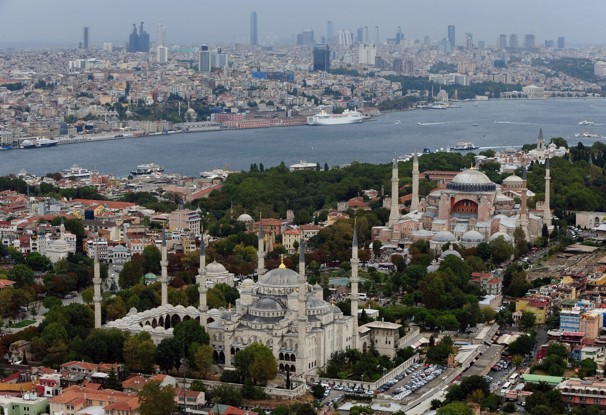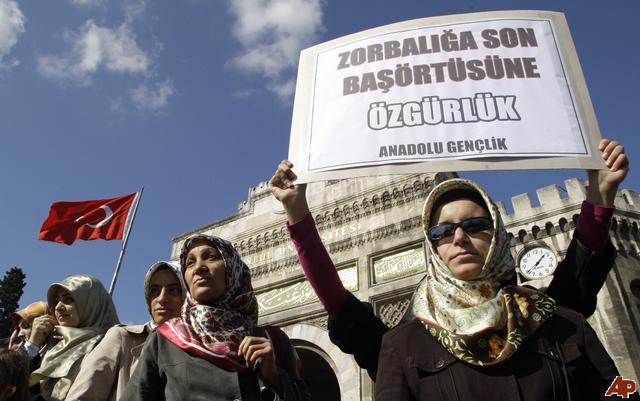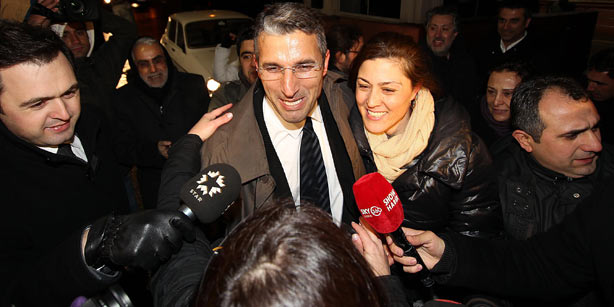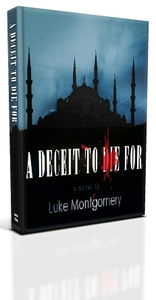Students of the New Testament know it best as Asia Minor, Paul's destination on his first missionary journeys to preach the Gospel to the Gentiles. The names of the Roman provinces through which Paul traveled preaching and teaching are still read every week in Sunday Schools across America.
The ancient names for the modern state of Turkey - Bithynia, Galatia, Pontus, Cappadocia, Phrygia, etc. are not all that unfamiliar to American believers.
Paul's preaching attracted converts but never failed to draw fierce opposition from the local population. On more than one occasion the natives, who might have been Greeks, Phrygians, Romans, Lycians, or any mixture of Assyrians, Hittites and Persians, tried to kill him and his companions for introducing to the Empire an unknown god, a new teaching of peace and love.
This has never been a popular message with Empire (think Darth Vader), but it eventually prevailed and all of Anatolia embraced the gospel. In fact, several of Paul's epistles were addressed to Anatolian congregations and all of the seven churches of Revelation are found in modern-day Turkey.
Now, two thousand years later, things have come full circle and those bearing Christ’s message of peace in Turkey find themselves facing opposition very similar to that encountered by the early apostles. In fact, the US Commission on International Religious Freedom claims that state persecution has become so serious that the very survival of Christian communities in Turkey is at stake.
The
report released last week reclassified Turkey as a Country of Particular Concern (CPC).
This article is Part II of a series on religious freedom in Turkey. The
first article introduced the USCIRF report, touching on troubling issues related to its politicization and Turkey’s state control of religion.
Even though the commission recommended Turkey be put in the same category as offenders like Saudi Arabia, the USCIRF report listed a number of positive developments in the country. Numerous articles have been written in the West about how Prime Minister Erdogan's "mildly Islamist" government heralds a changing of the tide and will knock Turkey out of NATO’s orbit and lead to more radical Islamic policies. Yet, the facts tell a slightly different story.
1) Erdogan has promised to replace the current constitution implemented by the military in 1982. This is particularly significant since much of the institutionalized “persecution” of religious groups in Turkey is connected with its peculiar view of secularism, which essentially makes the state the final arbiter in all religious affairs.
His opponents rightly understand this as an attempt to unshackle religion, thereby giving Islamists a greater voice. But, in all fairness, religious freedom cannot be guaranteed otherwise. Practically all religious minorities have welcomed the idea of a new constitution, proof that there is an urgent need.
2) In 2008, the Foundations Law was amended to facilitate the operations of religious foundations. Soon after it went into effect, 1,400 applications were received asking for the return of religious properties seized during the Republican era by the government. Over the next three years, 200 properties were, in fact, returned.
In 2011, Erdogan also passed an executive order that made it possible to obtain compensation for properties that had been previously seized by the state and could not be returned. Both of these steps are significant.
3) The Associations Law passed in 2004 and amended in 2007 makes it possible for all religious organizations to hold religious services and determine their own religious curriculum. This too was progress made by Erdogan’s government, yet one cannot help but wonder why it took “modern”, “democratic” Turkey so long to provide some legal underpinning for such a basic right.
Celebration of victory regarding this important civil liberty could be premature, for associations may not own property and their status may be revoked by local governors.
4) Erdogan’s AKP government has also granted unprecedented permission for minority religious services as well as building and restoration projects (e.g. the Armenian Akdamar church and Sümela Orthodox Monastery), indicating a new era of openness. The government has even been severely criticized by nationalists for its “leniency” with minority religious groups.
5) Although anti-Semitism has spread throughout the Middle East like a malignant tumor and Erdogan’s unprecedented popularity with Arabs is due almost entirely to his pro-Palestinian positions and criticisms of Israel, Jews in Turkey continue to enjoy rights seldom given to them in other Muslim countries.
In fact, Prime Minister Erdogan once called Turkey
Israel’s most important friend in the region, and said that anti-Semitism was a “crime against humanity,” statements one can hardly imagine coming from most Arab states. Furthermore, on January 29, 2012, Turkey became the first majority Muslim country to broadcast the 9-hour documentary
Shoah on state television to commemorate International Holocaust Remembrance Day!
This is only a summary of the AKP’s progress regarding religious freedom, progress unparalleled in the history of the Republic of Turkey, progress which has been affirmed by every religious minority in the country, and progress the USCIRF report dismisses as
ad hoc. Why are these impressive reforms being dismissed? Why is the AKP not being congratulated in the West for taking steps to promote religious freedom that no other government in the history of Turkey has been able to achieve?
It’s a simple question with a simple answer hidden in a phrase used several times in the report –
ad hoc.
In other words, the commission believes that none of these efforts address the institutionalized injustice that places onerous restrictions on religious freedom in Turkey. All of these reforms could be reversed tomorrow because no real protections have been afforded these communities.
At the end of the report, the commissioners offered this jarring explanation for their surprising recommendation to have Turkey downgraded from the “Watch” list to a Country of Particular Concern:
“After past genocide, and other violence, and current, suffocating legal restrictions, Turkey's Christian communities are barely hanging on. Every year that passes without substantial religious reform places these minorities in greater peril and helps seal their fate. In the Arab Spring, Turkey holds itself out to be an Islamist model. But it is no model for religious freedom. We have waited for ten years for the AKP to make a real difference in the Christians’ fate. We can no longer sit by and just “Watch.” Let’s look at the restrictions faced by Christians, Jews and religious minorities in Turkey.
Restrictions related to property. Since its founding, the Republic of Turkey has seized thousands of properties such as schools, businesses, hospitals, orphanages and cemeteries from religious minority congregations. The government’s right to confiscate such property is still in effect, putting the ownership of any religious minority in jeopardy and insuring “submission” to the powers that be.
Turkey does not recognize the corporate legal status of any religious minority. Instead, it has drafted a byzantine labyrinth of laws to control property ownership, transfer and operations. It not only restricts the flow of funds from a congregation in one part of the country to sister congregations in another part of the country, but only Armenian Orthodox, Greek Orthodox and Jewish communities may refer to their buildings as churches or synagogues. All other groups are merely “cultural centers” or “community centers.”
One of the most striking examples of the state’s draconian control is the Turkish government's confiscation of the 1,600-year-old Mor Gabriel Monastery, which served as the headquarters of the Syriac Church from 1160 to 1932. This seizure was realized with a ruling from the Turkish Supreme Court overturning the ruling of a lower court and granting a significant portion of the property to the Treasury.
Restrictions on Training Clergy The only center for Greek Orthodox theological education, the Halki Seminary on the island of Heybeli, has been closed since 1971. As a result, there is no way for the church to train new leaders in Turkey. Of course, the Greek Orthodox population of Istanbul has shrunk from approximately 100,000 to 4,000 since the 1955 pogrom executed to force Greeks out of the country.
The government has indicated a willingness to reopen the seminary, but maybe that is only because the congregation has dwindled to the point that its extinction is all but certain. Whatever the case, 41 years later, the seminary remains closed and there is disagreement over the school's official status.
Other religious minorities are in the same boat. The country's largest non-Muslim religious minority, the Armenian Orthodox church, also has no seminary for theological education and currently has only 26 priests serving population of approximately 65,000.
Religious Education Religious education is constitutionally mandated in Turkish primary and secondary schools and the curriculum is determined by the Ministry of Education’s Department of Religious Instruction. Although non-Muslim children are not, by law, forced to attend, some schools have refused to allow the exemption.
Moreover, the curriculum’s description of minority beliefs is biased, factually incorrect and encourages societal discrimination because of the insulting language employed. For example, Christian missionaries are referred to as criminals and children are taught that the Bible has been changed.
The only minority schools allowed by law are for communities covered by the Lausanne Treaty – the Armenian Orthodox, Greek Orthodox and Jewish minorities. But regulations make is difficult for minority children to register even in these schools and there are no schools for minorities such as Catholics, Protestants, Alevis, Syriacs or Jehovah’s Witnesses.
In short, the policies of the Turkish government seem to be designed to ensure that the influence and growth of minority religions is strictly controlled, even over their own children. The purpose of these policies seems obvious: to force assimilation and thwart diversity.
The accuracy of the Commission on International Religious Freedom was confirmed by a conversation with Turkish pastor Ibrahim Deveci. Here are the highlights of that interview:
“It is a difficult place for a Christian to live. It's hard to find a job, get married or even express my views in public. It is difficult to work in certain organizations or obtain a security clearance.
“It is really hard for children. In Diyarbakır, one child was pressured to repeat the Islamic confession of faith and when he refused, he was slapped by the teacher. From that time forward, the other children treated him as an enemy.
“Sometimes, people are afraid of persecution so they don’t change the religion on their ID cards and are forced to take the mandatory religion (Sunni) classes.
“The biggest threat we face is the threat to our lives. There have been more martyrs during the last few years than at any other time in modern history. Two Catholic priests have been killed and three brothers in Malatya.”
When asked how Christianity was perceived in Turkey, he said, “I'm afraid we are viewed very negatively and it has gotten steadily worse over the last 18 years.”
In response to a question about whether the AKP was turning Turkey away from the West and towards the world of Islam, Mr. Deveci said, “I don’t get that involved in politics. But, this government (AKP) is clearly more strategic and more determined to spread Islam. Ironically, it was more difficult under previous governments. This is the easiest time in modern history for the Turkish church. We don't know what will happen in future, but we seem to have more freedom now.
“This is because we are a very small minority - around 4000 believers. So they don't take us seriously. Yet, at the same time, we are viewed as a threat. It seems that some rights have been given back due to the EU. Some foundations are being returned to ethnic minorities, some churches are being repaired and restored. It is good but inadequate. A little make-up on a few churches is not enough. Christians need to be recognized as legitimate citizens of the State.”
Mr. Deveci clearly feels like Christians in Turkey are viewed as turncoats or traitors.
When the conversation turned to the fact that 20% of Turkey was Christian when the Ottoman Empire collapsed and yet today Christians make up a mere 0.1% of the population, Mr Deveci said:
“There are many reasons for this. Essentially, it is an ‘evaporation’ policy, an anihilation policy. Most Christians have immigrated to other countries to escape persecution. The AKP thinks the new generation is a bit luke-warm when it comes to Islam. They want to see a religious revival. I will be happy with my country when I see that Christians are granted the same rights as Muslims.
“There was and is an effort to unify the nation in terms of both language and religion. They say, ‘Every Turk is born a Muslim.’ Actually there is incredible diversity here, but people have not been free to express this. Turkey has suffered greatly due to the loss of cultural diversity.
“They talk about tolerance. Yes, there is tolerance – that is, until Christians become a bit more informed and start sharing their faith. That's where tolerance ends.”
Mr. Deveci’s perspective certainly seems to corroborate the 2012 US International Religious Freedom Report. In fact, anyone who knows anything about Turkey has known about the severe restrictions on religious freedom for years.
Consider the following US diplomatic cable published by
Wikileaks regarding an anti-missionary sermon sent to every mosque in the country by the Directorate of Religious Affairs, proof that American officials have long been aware of Turkey’s infractions.
“Turks tend to be profoundly hypocritical on issues relating to Islam and Christianity. Hypersensitive to any perceived Western slights or misconceptions about Islam, they routinely spread misinformation about Christianity and sow fear about missionaries. Gormez, like other pious Turks, considers conversion to Islam a natural progression, but is deeply resentful of Muslims who convert to Christianity. It is important to remember that this insidiously anti-Christian sermon was prepared not by a private Islamic group but by one of the largest branches of the GOT (Government of Turkey) bureaucracy.”
However, NATO membership and a strategic partnership with the US have their advantages, one of the most important of which is special treatment when it comes to violations of basic human rights.
Maybe this report signals an end to these days of privilege and the beginning of genuine pressure on Turkey to change. Unfortunately, even if it does come, it will be too little and too late for the thousands of religious minorities who have immigrated or been absorbed. As the commission stated so well, it is time for America to stop being a bystander when it comes to the violation of individual civil liberties.
Being a "strategic partner" must not be a Get-Out-Of-Jail-Free card.



 RSS Feed
RSS Feed

